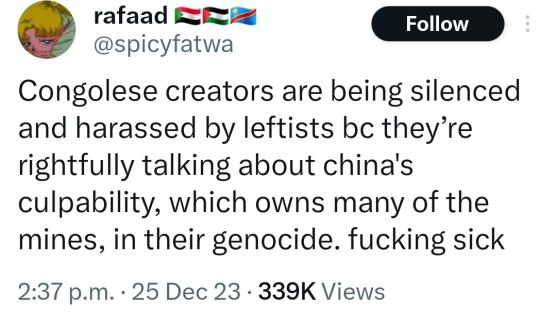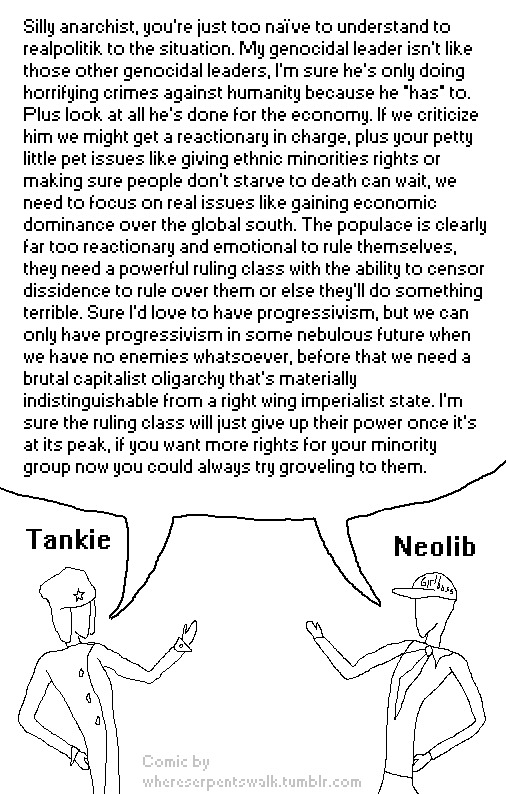#neoliberal capitalism
Text

#fyi#psa#reminder#healthy reminder#reminders#homeless#poverty#housing#rent is theft#landlords are parasites#landlords are scum#ausgov#politas#auspol#tasgov#taspol#australia#fuck neoliberals#neoliberal capitalism#anthony albanese#albanese government#landlords are leeches#landlords are bastards#landlords are the worst#landlords#landlord#class war#homelessness#eat the rich#ea
179 notes
·
View notes
Text
Imagine what neoliberal propaganda articles look like in various evil empires.
"Women in Sauron's army. How female orcs have helped create a more inclusive global conquest." - The Mordor Examiner
"How the death star program is revitalizing the galactic economy." - The Coruscant Times
"Despite progressive cries to "Free Arrakis" situation with House Harkonnen more complicated then most people think." - The Corrino Fund
"How the anti imperial rabbit hole can easily lead to people to pro choas views." - Ultramar Today
#196#anticapitalistically#anticapitalist#anticapitalism#anti capitalist#anti imperialism#fuck neoliberals#neoliberal capitalism#neoliberalism#propaganda#warhammer 40000#warhammer 40k#40k#star wars#my thougts#my writing#lotr#lord of the rings#dune#arrakis
1K notes
·
View notes
Text
Notes Toward Finding Community, Or, How to Find Community When You Feel Isolated
Neoliberalism sucks for a ton of reasons. From the enclosure of every common, to the commodification of every creation, it feels like a muzzle on humanity that gets tighter and tighter. One of the most underexplored aspects of neoliberalism is the way in which it creates and reinforces isolation. People don’t really have communities outside of consumption or compulsion. This is problematic for a ton of reasons, namely that it prevents us from fulfilling our basic needs. Humans are social creatures. People need to have connections with folks. People may not all need the same levels or intensity of connections, but connections are important nonetheless. To lack in the ability to socialize meaningfully is to ensure worse health outcomes, mentally, emotionally, and physically. But, I don’t mean to freak you out. I think that there are steps we can take to star building community, bridging gaps with the people around us.
Think About What You Want
When folks feel very isolated, it can be easy to accept anything. If we’re in a vulnerable state, that could leave us open for ending up in precarious situations. One way to fight against this is to start from the position of imagining what community looks like. Is the type of space we want to occupy based around interests (fandom, hobbies)? Religions, spiritualities, social issues? If we are able to list the things that excite us, we have a good idea of what to look for, and can focus our efforts towards finding those spaces.
Find the Watering Holes
With the spaces we’re interested in on hand, youcan find where folks gather. Every community has virtual and/or in-person spaces. For example, if you’re a film fan, you can look for indie cinemas, folks putting on screenings, or look into film societies where you live. For activism, I’ve written a whole guide on how to get started. Looking for those spaces will allow you to start getting integrated in the space. Really think about how you can occupy the same physical and digital spaces of people who are into what you’re into.
Go Meet Folks
Now, this may be difficult, depending on your disposition. The quickest way to meet folks is to put yourself out there. It’s always vulnerable to put yourself on the line in this way, but it’s super necessary. When you’re in spaces with similar folks, you have talking points built in! You don’t have to worry if the folks around you will like movies at film club. If you are enjoyable to be around, through being nice, interesting, and/or being an active listener, you’ll be making connections in no time. If you’re not willing to talk to folks, it’ll be hard to make connections. Being open is an asset towards the end of getting connected. At the very least, consistently go to events and spaces in your interest area(s). Maybe you’ll bump into an extroverted person that can show you the ropes.
Be the Change You Want to See
As you get out there, think about how you can start catalyzing community. Maybe you host a dinner for neighbors. Maybe you start a book club. Or even a neighborhood garden, or cleanup event. In this way, you’re flipping the issue on its head. You’re creating the space to meet folks yourself. It’s like being a magnet, drawing others to you.
We need community. It’s a necessary thing, you know? So, hopefully, keeping these things in mind helps in that regard.
#economics#economy#econ#anti capitalists be like#neoliberal capitalism#late stage capitalism#anti capitalism#capitalism#activism#activist#direct action#solarpunks#solarpunk#praxis#socialism#sociology#social revolution#social justice#social relations#social ecology#organizing#complexity#resist#fight back#organizing 101#radicalization#radicalism#prefigurative politics#politics
541 notes
·
View notes
Text

#dark academia#light academia#anti capitalism#abolish capitalism#neofeudalism#neoliberalism#neoliberal capitalism#unionize#eat the rich#activism#vote#antiwork#collapse#sustainability#degrowth#socialism
438 notes
·
View notes
Text
Literally, your "democratic" government would rather fuck up the entire world with Imperialism than to have Americans realize their government can do more for them.
And THAT is why Actually-Existing Socialist countries cannot be allowed to survive and prosper.
#us imperialism#us hegemony#imperialism#capitalist imperialism#neoliberalism#neoliberal capitalism#socialism#communism#marxism leninism#socialist politics#socialist worker#socialist state#socialist news#socialist#communist#marxism#marxist leninist#progressive politics#politics
222 notes
·
View notes
Text

Many people want to know why, out of the entire white segment of society, we want to criticize the liberals. We have to criticize them because they represent the liaison between both groups, between the oppressed and the oppressor. The liberal tries to become an arbitrator, but he is incapable of solving the problems. He promises the oppressor that he can keep the oppressed under control; that he will stop them from becoming illegal (in this case illegal means violent). At the same time, he promises the oppressed that he will be able to alleviate their suffering-in due time. Historically, of course, we know this is impossible. and our era will not escape history.
Kwame Ture
45 notes
·
View notes
Text
I think this may be the spiciest NYTimes article I’ve ever read. And since it wears its data up front: That’s a compliment.
(Gifted for y’all)
72 notes
·
View notes
Text
If They Ever Made a Historical Drama movie about the Americans with Disabilities Act
This bit from the speech by President George H. W. Bush, on July 26, 1990, would be called "Foreshadowing," and there would be an ominous swell in a minor key in the movie score:
The Administration and the Congress have carefully crafted the ADA to give the business community the flexibility to meet the requirements of the Act without incurring undue costs. Cost may be taken into account in determining how an employee is “reasonably accommodated,” whether the removal of a barrier is “readily achievable,” or whether the provision of a particular auxiliary aid would result in an “undue burden.”
Transcript of Statement By The President July 26, 1990 (From the National Archives of the United States)
#The A.D.A.#disability history#Neoliberal Capitalism#large text#bold text#the fine print on our civil rights#the First President Bush#history in my lifetime
24 notes
·
View notes
Text

More “horrific” than the genocide you’re committing?
#More “horrific” than the genocide you’re committing?#genocide#no pride in genocide#palestine#free palestine#freepalastine🇵🇸#free gaza#gaza strip#gaza genocide#gazaunderattack#gaza#israel#israhell#benjamin netanyahu#fuck netanyahu#netanyahu a criminal of war#bibi netanyahu#anti netanyahu#ausgov#politas#auspol#tasgov#taspol#australia#fuck neoliberals#neoliberal capitalism#anthony albanese#albanese government#zionazis#zionistterror
58 notes
·
View notes
Text



#feminist#feminism#social justice#free congo#congoisbleeding#imperialism#colonial violence#current events#cobalt#congo genocide#dr congo#democratic republic of the congo#congo#drc#neoliberal capitalism#fuck capitalism
2K notes
·
View notes
Text

Made this political cartoon. Feel free to share it around just don't remove the watermark.
#196#my thougts#leftism#leftist#neoliberalism#fuck neoliberals#neoliberal capitalism#libertarian socialism#neoliberal thought#liberalism#anarchist#anarchism#anarchocommunism#anarchopunk#tankie#tankies#marxist leninist#marxism#social issues#socialism
587 notes
·
View notes
Text
Get Organized!
I recently made a post about how to get started in doing radical stuff. Said otherwise, that post was meant to answer the question, “Where do I go, when I know the world is fucked?” This post covers similar ground, but is more interested in the theoretical side of things. Not to say it won’t be practical. It’s just saying that if you’re not the kind of person that can read a little bit and feel confident to act, or you like having a little bit more scaffolding, that you also deserve a resource. I’m hoping to contribute to that today. As the title says, we’re going to be focusing on organizing. This is one of those things that is said a lot, but is actually defined much less often. Tangentially, you should be aware and ready for this for literally everything relating to politics. Any word that you hear used, you should always ask for a definition. Many a movement would have gone differently if folks spent more time trying to find semantic alignment. Anyway.
When I say organizing, I mean catalyzing the energy of folks, acting from a specific theory of change. A theory of change is a thought process or method to create some kind of social impact in a particular context. When the world sucks in some particular way, and you want it to stop sucking, the answer is to organize, in the way defined above. By organizing, we lean on the idea of collective power to create changes that are currently only afforded to those with authoritarian power. It’s a game of evening the odds.
I will also note that this assumes that you are going to be framing your work around broad-based movements, that have (mostly) aboveground (as in “legal”) tactics. This is not necessarily a statement of what is correct; small groups that are in concert with larger movements are also able to be successful, even when doing more confrontational tactics.
So, to organize, I’d say it would be useful to be involved in movements already. You can look at my radicalism 100 post to see how that could look. Either way you have to know what your where your niche(s) lie. In other words, what sits in the middle of the intersection between what you like to do, what you are good (or can become good/have a willingness to become good) at, and what is needed in your context. I tend to center the local level, because that is the area where influence is more tangible, and fits into how I see a resilient world coming to fruition. So, you have to ask yourself, “What can I do, that I would enjoy doing, in my community?” Then, you should find some other people who are in that same vibe. Depending on your approach, this may take no time at all, or a lot of time. I listed some ideas for finding folks in radicalism 100, but to reiterate: look for social medias and IRL presences of people who are into the same topics, and connect with them. See where you can plug in, and see where the contours of organizing in your local contexts are. Ideally you can see places where gaps can be filled.
Once you find an issue that you think has potential, and you have a couple of people to do some organizing with, you have what I think of as a catalyst group. This group is meant to start (or assist) in a certain kind of reaction, but not lead it. Trying to control movements is both futile and antithetical to liberation. So, to ground us, we have two very important ingredients: a topic/issue/area of focus to organize around, and a group of folks to work with. Once this is in place, you can co-create a strategy with your organizing team. I’d recommend employing an encircling strategy as your long-term or meta strategy, where multiple sub-strategies and campaigns happen within this frame. Essentially, this allows you to employ campaigns across a matrix of tactics. Within the encircling frame, you can create a campaign (what I consider a “short-term” strategy). Campaigns are a series of actions over time. Strategies are a series of campaigns over time.
A useful way to think of strategic planning is by separating the process into stages, grouped by movement size.
Small: Organize small actions/protests, figuring out ways to build movement visibility and interest
Medium: Focus on scaling up the participation, through mobilizing efforts. Promote your actions, get people involved, and encourage meaningful action.
Large: Create a movement. The kind of thing people hear about.
To organize on the smallest level, the easiest thing might be to just do plan actions that are well within your team’s capacity, organize those actions, and execute. If you can swing it, I’d really recommend to not lean too much into symbolic actions. There are risks with every action, no matter what legal frameworks your locality has. If you’re going to do something, you have to be very intentional with:
what you hope to accomplish through the action
a high likelihood of success for the action
doomsday planning in case something goes wrong
If you’re able to do this, then you will be leagues ahead of a lot of other folks. This is not to make it a race or a competition, but it is moreso to say you can symbolically represent and catalyze action without becoming a martyr.
As you’re doing actions, you should be refining your idea of who’s impacted by the issues more and more. As that picture gets clearer, you should spend more and more time understanding and listening to those folks. Ideally, you get to a point of co-creation, where you are enabling people to fight for themselves and build their autonomy. That is the kind of thing that prevents movements from dying. Organizers should be trying to put themselves out of business, in a sense. Catalysts should be able to come from anywhere.
To scale up, I’d recommend a focus on meeting folks. Take the ideas of deep canvassing, where you empathetically have conversations with whoever is impacted by the issue you’re responding to, through the lens of giving power to those people. Rather than asking them to feed into some established system of power, encourage them to take action into their own hands, as a collective.
I’d also recommend that as capacity grows, build a “positive” or “constructive” power. This can look like a lot of things. Whether it is a block club, neighborhood pod, community council, or community assembly, dedicate energy into creating spaces where people can start building their democratic and consensus muscles. These can simultaneously act as the training ground and alternative governance structure that allows folks to start making decisions for themselves in a very specific way.
This will ideally allow the movement to really start to be intersectional. It should be intersection minded from the outset, but that can be difficult to meaningfully actualize in the early stages of the movement. since single-issue movements are inherently brittle (if your movement revolves around getting something on a ballot, winning or losing just ends the movement)—there are throughlines that connect all movements, and those lines should be made visible and traveled. Environmentalists should fight for housing rights, LandBack, Reparations, and a host of other things. The more developed our networks, the stronger our movements will be.
#economics#economy#econ#anti capitalists be like#neoliberal capitalism#late stage capitalism#anti capitalism#capitalism#activism#activist#direct action#solarpunks#solarpunk#praxis#socialism#sociology#social revolution#social justice#social relations#social ecology#organizing#complexity#resist#fight back#organizing 101#radicalization#radicalism#prefigurative politics#politics
266 notes
·
View notes
Text
What is going to happen when nobody can afford to live anymore?

#reddit#antiwork#anti capitalism#abolish capitalism#degrowth#neofeudalism#collapse#dark academic#dark academia#neoliberalism#neoliberal capitalism#socialism#activism#sustainability#unionize
172 notes
·
View notes
Text
Hey, remember that time a US Pentagon "Accounting error" gave an additional $6 Billion in Military Aid to Ukraine?
Yeah, that happened despite what mainstream media outlets like USA Today are trying to claim.
But, hey you remember that time the US made an accounting error that opened up $6 Billion in extra housing for the homeless and under sheltered?
No, because that would never happen.
"Accident" implies you didn't mean to send the extra arms to Ukraine. It doesn't take a rocket scientist to figure out the US would have found an excuse to send the extra weaponry regardless of the accounting.
But accounting errors that help the Working Class? It's unimaginable.
#ukraine proxy war#ukraine war news#us news#us politics#neoliberalism#neoliberal capitalism#homeless crisis#homelessness#homelessness in the us#us homelessness#socialism#communism#marxism leninism#socialist politics#socialist news#socialist worker#socialist#communist#marxism#marxist leninist#progressive politics#politics#nato#us imperialism#us wars#western imperialism#imperialism#capitalist imperialism#anti capitalism#anti capitalist
166 notes
·
View notes
Text
How the law actually works:
If you're rich, you can do whatever you want, as long as you don't fuck with other rich people's money.
If you're non-rich, you'll be subject to laws to create the illusion of justice.
#anarchism#anarchy#socialism#leftism#marxism#revolution#social justice#anti capitalism#fuck neoliberals#neoliberal capitalism#neoliberalism#capitalism is evil#late stage capitalism
9 notes
·
View notes